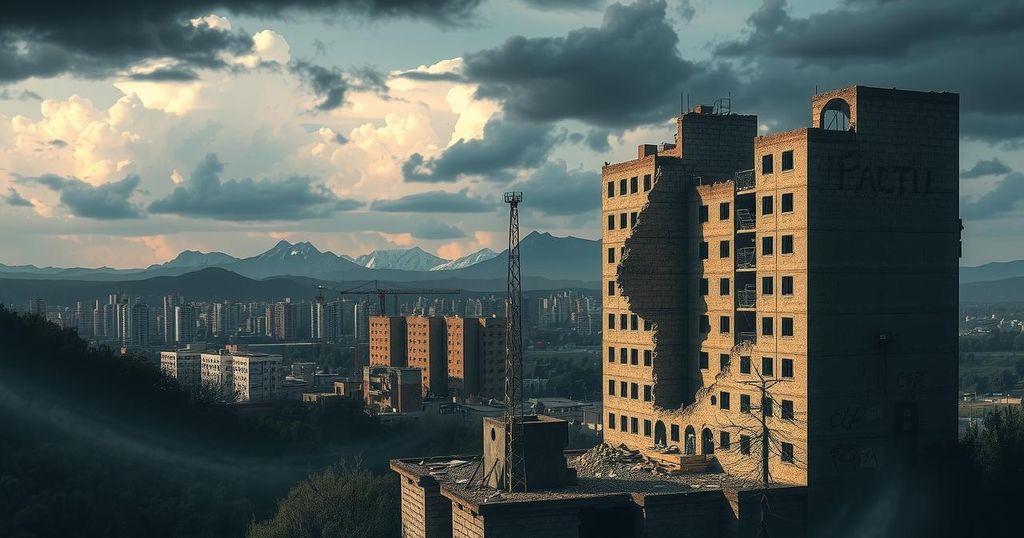The conflict in Goma, DRC, is worsening, with fighting between Rwandan-backed M23 rebels and Congolese forces leading to a humanitarian crisis. UN officials emphasize the urgent need for international support to safeguard civilians and enhance humanitarian efforts. Recent reports highlight the dire conditions faced by millions of displaced individuals and the critical infrastructure challenges in the region.
The situation in Goma, eastern Democratic Republic of the Congo (DRC), is deteriorating as battles intensify between Rwandan-backed M23 rebels and Congolese forces. Jean-Pierre Lacroix, the UN chief of Peace Operations, described the crisis as “volatile and dangerous,” emphasizing the challenging conditions faced by UN personnel who have had to seek temporary shelter during the ongoing conflict. Their limited access to information complicates the assessment of the evolving situation, although peacekeepers remain in position.However, the safety of non-essential personnel is paramount, prompting their relocation from Goma. MONUSCO personnel are committed to their humanitarian responsibilities, focused on protecting civilians and assisting in disarmament efforts under international humanitarian law.
Bruno Lemarquis, the UN Deputy Special Representative in DRC, provided an alarming overview of the humanitarian crisis, stating that Goma’s situation adds to one of the world’s most prolonged crises. With nearly 6.5 million displaced individuals across the country, including three million in North Kivu, the conflict has exacerbated already dire conditions. He reported severe violence against civilians, including direct shelling of the city center, resulting in casualties at locations such as the Charity Maternity Hospital. Basic utilities and healthcare services have been critically disrupted, impeding the ability to manage the influx of wounded individuals.
Call for urgent humanitarian intervention was made by Mr. Lemarquis, advocating for temporary pauses in hostilities to enable safe civilian evacuations and aid delivery. He stressed the urgent need to act decisively to prevent further civilian casualties and mitigate suffering. Regarding Rwanda’s alleged involvement, Mr. Lacroix confirmed the presence of Rwandan troops supporting M23, condemning their actions that resulted in the deaths of peacekeepers, thus underscoring the critical context of stability in Goma.
Diplomatic initiatives are underway, with Mr. Lacroix underscoring the UN’s dedication to backing regional peace efforts, including a forthcoming summit led by the East African Community and a session of the African Union Peace and Security Council. Emphasizing the need for greater international engagement, Mr. Lemarquis noted a recent $70 million allocation from the Central Emergency Response Fund aimed at bolstering humanitarian efforts, reflecting the urgency of the situation. The press conference ended with a definitive call for immediate international assistance in ensuring humanitarian support and preventing further bloodshed.
The ongoing conflict in eastern DRC has been escalating primarily due to the M23 rebel group, which has received backing from Rwanda. The region faces significant humanitarian challenges, with millions displaced by years of conflict. The United Nations and various aid organizations are actively working to address the crisis while also contending with the realities of operating in a war-torn area, marked by violence and instability. Amidst these challenges, international efforts, including funding and diplomatic initiatives, are critical for alleviating the plight of affected civilians and restoring peace.
The battle for Goma has escalated into a critical humanitarian crisis, necessitating immediate international response and intervention to avert further loss of life among civilians. Key UN officials have called for urgent humanitarian aid and engagement from the global community, reinforcing the importance of protecting both the local population and UN peacekeepers in this volatile environment. Efforts must be intensified to manage the ongoing conflict and provide necessary resources to those affected.
Original Source: news.un.org




